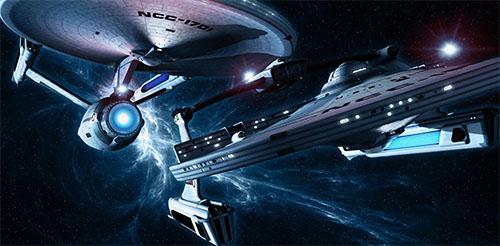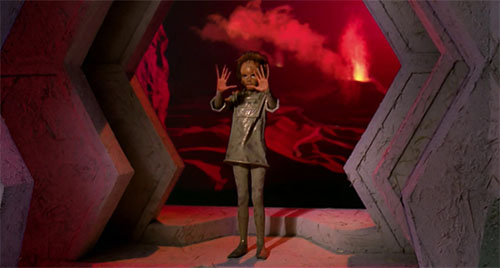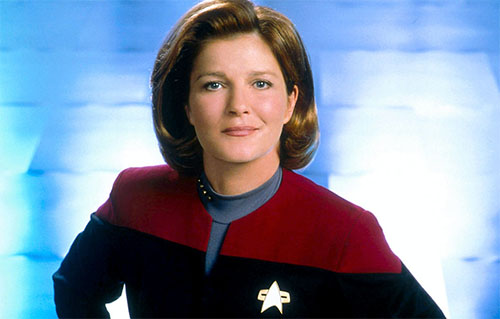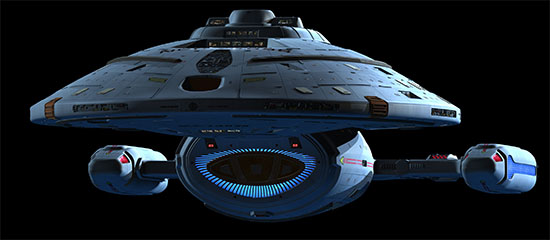
The writing is really bad.
This is the biggest problem. Voyager regularly deals up truly horrendous episodes at a pace roughly equivalent to the Original Series, but it doesn’t surround those episodes with the highs of TOS (which produced some of the best episodes of television ever made).
The acting on the show is also incredibly problematic. There are several performers who are just flat-out terrible. Others are crippled by the bad writing. The cast notably lacks the stellar talents like Shatner and Stewart: The best actor on the show is Robert Picardo, but it’s really difficult to run a show out of sickbay. (Which is why most of the series’ best moments come after the Doctor gets a portable holo-emitter and Jeri Ryan joins the cast.)
Coming back to the writing, though, we can also note that the writer’s room was burned out: The same basic team had produced hundreds of episodes of Star Trek at this point and they were just running out of ideas. There’s a lot of rehashed Trek fan-fiction taking the place of original science fiction ideas. (And if you peek behind the scenes, you’ll discover a surprisingly large number of rejected scripts from other series getting dumped into Voyager.)
Finally, the show embraced ideologies that were curiously antithetical to a lot of the futurism that the franchise had previously fanfared. For example, “Measure of a Man” is one of the most celebrated episodes in all of Trek, so it was weird to see so many episodes of Voyager endorsing Janeway’s position that the Doctor (and other forms of artificial life) weren’t actually sentient beings. Voyager is also where the Prime Directive reached bat-shit insanity.
What might have saved the show would have been to embrace the long-running story arc with meaningful continuity that its premise inherently promised. But meddling from above repeatedly prevented that from happening.
Nail in the coffin: The entire series hinges on Voyager being stranded in the Delta Quadrant. The writers accomplished that by making Janeway an asshole; misinterpreting the Prime Directive; and then executing a plan that makes no sense. (Put your bombs on a timer!) The entire series got off on the wrong foot and was based, ultimately, on some really stupid writing.
Filed under: Reviews | Comments (16)
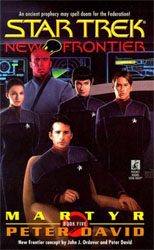 I was thinking about writing a full and proper review of the Star Trek: New Frontier novels by Peter David. It was not necessarily going to be a review full of sunshine and happy thoughts (the prose and plotting are both sloppy; the characters are frequently off-model; the exposition is clumsy and redundant; the continuity is inconsistent and contradictory), but I was certainly enjoying them as pulp fiction.
I was thinking about writing a full and proper review of the Star Trek: New Frontier novels by Peter David. It was not necessarily going to be a review full of sunshine and happy thoughts (the prose and plotting are both sloppy; the characters are frequently off-model; the exposition is clumsy and redundant; the continuity is inconsistent and contradictory), but I was certainly enjoying them as pulp fiction.
But having just finished the fifth book (Martyr) I’m afraid I’ve hit the straw that broke my back:
Robin Lefler’s mother was kidnapped by an alien race called the Momidiums? Her MOM was kidnapped by the MOM-idiums?
No. Sorry. After a book filled with clumsy puns, you have officially crossed the line from “eye-rolling” to “Cheap Xanth Knock-Off”. And I want no part of it.
Filed under: Reviews | Comment (1)
If I had the power to take over the Star Trek franchise at any time during its history, the moment I would choose would be just after Unification, Part I: TNG was at its height of popularity. Every thread had come together to form the seed of a vast, star-flung epic of interstellar war between the Federation and the Romulan Empire.
And then, with Unification, Part II, the producers and writers chickened out: The crisis was averted through a convenient deus ex machina, the character of Sela was conveniently shuffled off-stage, and Spock’s insurgent philosophies were wiped from the series’ memory.
Perhaps we’d lose the brilliance of “I, Borg”, “The Inner Light”, “The Chain of Command”, and a few other classics… but TNG could be turned from its eventual decline to a vibrant new life in which the political machinations of the Klingons, Romulans, and Cardassians would all be interwoven into a compelling saga.
If we wanted to get really daring, Picard would be promoted to Admiral – although his role on the series would continue (he would be the lynchpin which would allow us to get a wider perspective on the war without contrivance; and the Enterprise would be his pet ship for black ops assignments).
Then, when TNG had come to its natural conclusion along with the Romulan War, we would skip the ultimately stagnant waters of DS9, Voyager, and Enterprise – opting to take the franchise in a bold new direction: Hiring visionaries like Vernor Vinge and Iain Banks, we would re-imagine a future a hundred years in TNG’s future… in which all of the scientific devices and innovations we have seen on the series are taken to their logical conclusion.
Filed under: Random | Comment (0)


